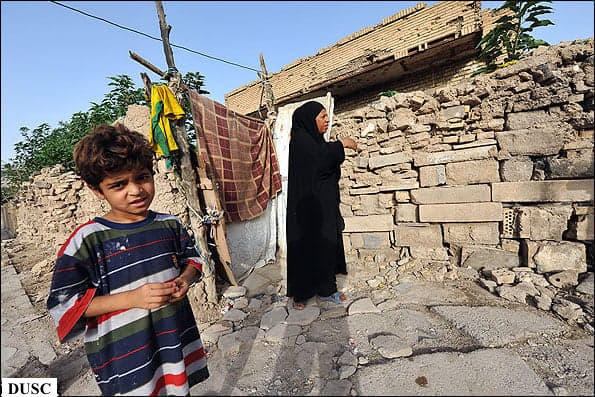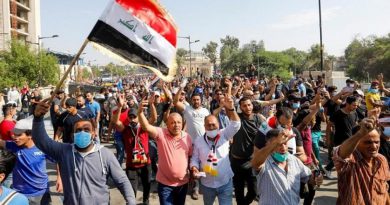How Iran’s regime steals childhood: Heart-breaking Stories of Ahwazi children
by Rahim Hamid and Yasser Assadi
Nobody asks why they are cleaning car windshields at the traffic lights or washing graves or scavenging in garbage bins when they should be at school…
The Ahwaz region in what is today the south and southwest Iran is home to millions of ethnic Ahwazis, a marginalised and overlooked minority who typically live well below the poverty line, without adequate health care or social services. Many have been relegated to living in shantytowns neighbourhoods on the outskirts of regional capital Ahwaz city following mass displacement during the Iran-Iraq War during the 1980s over three decades ago, along with other Ahwazi cities such as Muhammarah and Abadan. While the region is home to considerable oil and mineral resources, which form the overwhelming majority of revenue for the Iranian government, unemployment is rampant.

For most Ahwazi families in these impoverished areas, it is impossible to maintain any semblance of normality. The widespread unemployment, periodically exacerbated by politically or ethnically motivated edicts from Tehran, has left these families unable to afford costs associated with healthcare, basic necessities, or education, doomed to living in close to medieval poverty.
As a sadly predictable result, it is common for Ahwazi children to discontinue their education in favour of finding any sort of paying work in the hope of helping their families and providing basic necessities for themselves.
Some Ahwazi children scavenge domestic and industrial waste for plastic or glass materials in order to sell to recycling factories.
Others seek employment as street vendors, putting their lives in danger by selling flowers by traffic lights, washing windshields and the like. Others look to sell flowers or wash graves in local cemeteries.
Due to ongoing water shortages and recurrent contamination of local water supplies, some children have been selling water to local residents, often laboriously hauling water for considerable distances to reach affected areas where they could find buyers.
There are no statistics provided by local authorities, and state-run charity Toloe MehrAfrinan only tracks those children who register with it; the charity offers the equivalent of $8 per month along with some educational services, which is palpably insufficient even for the children themselves, much less for their families.
Recently, the authors of this article had a discussion with two human rights activists from Ahwaz, specialising in issues relating to child labour. The activists use the pseudonyms of ‘Ahmad’ and ‘Adel,’ documenting their interactions with child labourers over the past few months. The activists cannot identify themselves because all Ahwazi civil rights groups are banned, and individuals who speak out against the gross mistreatment of Ahwazis are targeted by authorities. The authors’ interview with Ahmad and Adel, as it paints a sobering picture of the extent of child abuses and human suffering, underscores important issues disregarded by the mainstream coverage of life in Iran. The stories of these nine children, detailed below, are only a small portion from the hundreds of child labourers in Ahwaz.

Ahmad struggled to find proper words to convey the depth of poverty. “It’s just… heartbreaking,” he said. “When I visit the destitute areas there, I see sights that tear my soul, like young drug addicts who should be full of life nodding at the roadside or lying unconscious under the trees. The homes look derelict, with broken windows and doors half-hanging off, with the residents sitting in front of them. The youngest kids are running around in filthy torn clothes, and the only ‘treats’ they get are half-rotten fly-blown fruit or a bit of cucumber. It is just generations of hopelessness, extreme poverty.”
At the peak of coronavirus outbreak in Iran, with more than 8000 people effected, and over 500 dead from the virus itself (and many others from related causes, such as alcohol poisoning from disinformation about prophylactics in Ahwaz), scavenging for food and material in the trash endangers Ahwazi children and their families. Although most children have not suffered the ill effects of the virus, touching infected surfaces can still make them into carriers, which facilitates the spread of the disease among the more vulnerable adult populations.
“New York-based human rights lawyer Irina Tsukerman commented on the report: “The abuse and deprivation these poor children undergo on a daily basis is unconscionable and outrageous. However, the Western media does not cover these stories; heart-wrenching as they are, only domestic issues are of interest to the press that shies away from confronting global abuses and injustice.
“But let us look at the big picture. This extreme property is testimony to the regime’s failure and illegitimacy. We all know the stories of regime-connected people who frequently travel to the West to do business, to study, and to enjoy a good life. They go back and forth with no restrictions. Refugee-related controversies do not affect. These people are corrupt; they have stolen everything they can from the population, while giving not even the basics of medical care in return. Furthermore, the Ahwazi population is unique isolated and abandoned. Any movement to demand fundamental rights that should be allotted to any citizens is met with an outcry about alleged separatism, as if demanding human rights is politically controversial or revolutionary.
“So, what happens to the vast wealth of the oil-rich region where the Ahwazis reside? Most of the oil fields are either rented out to the Chinese, because the regime is virtually bankrupt, or otherwise under the control of the Tehran apparatchiks. Regular people who do not do business with the regime see not a riyal of it. Most of that money goes to the ever-expanding security and intelligence apparatus, which, in addition to the domestic saboteurs, spies, and assassins, also includes foreign recruits. Plenty goes to the upkeep of foreign militias, war efforts in Syria and elsewhere, suppression of protests in Iraq and Lebanon, or the arming of proxy groups, such as the Houthis in Yemen, as well as to the various terrorist operations and ideological outreach around the world.Video Player00:0000:28
“While Iran builds schools and universities for Lebanese Shia, Ahwazi children grow up starving and illiterate, either due to the lack of funding for schools or because they simply cannot attend as they need to work and take care of their families, often broken and devastated by tragedies, if not imprisonment, torture, and executions. While regime’s children go to top Western universities, Ahwazi children live hand-to-mouth, and work the worst jobs, and risk sexual exploitation so they could provide bread for their families – and not much more than that.
“When countries that look to do business with Iran overlook Iran’s aggression in the region, they should remember that none of the money from these deals reaches the regular people of Iran, that by funding and supporting the survival of the regime in any way, Western countries directly contribute to the regime’s ability to steal childhood from the Ahwazis with impunity”.
Ahmad, whose activism is child labour, struggled to find proper words to convey the depth of the poverty. “It’s just… heartbreaking,” he said. “When I visit the most destitute areas there, I see sights that tear my soul, like young drug addicts who should be full of life nodding at the roadside or lying unconscious under the trees. The homes look derelict, with broken windows and doors half-hanging off, with the residents sitting in front of them. The youngest kids are running around in filthy torn clothes, and the only ‘treats’ they get are half-rotten fly-blown fruit or a bit of cucumber. It is just generations of hopelessness, extreme poverty.”
Most children in Ahwaz dropping out of full-time education before reaching secondary level, many quitting before they learned to read or write. With no hope of decent employment for this systemically marginalised group, there’s a sense of learned helplessness among many in the area, Ahmad explained, which repeats itself in a cycle of self-fulfilling prophecy, with children growing up knowing that any protest against this grotesque injustice will only get them arrested.
“Nobody asks the kids’ names,” Ahmad says. “Nobody asks why they are cleaning car windshields at the traffic lights or washing graves or scavenging in garbage bins when they should be at school, having fun with friends, doing normal kids’ stuff, and enjoying their childhood – because that is just how it is, this is ‘normal’.”
“Last week, I decided to interview some of these child workers from the most deprived districts – I went to a densely populated ghetto area of Ahwaz city near the Beheshtabad Cemetery, a big graveyard where hundreds of people visit their family members’ graves on Thursdays.

“While I was there, amid the noise and the sounds of grief, I caught sight of these child labourers, aged between 11 and 13, carrying small bottles of water and cloths, rushing to every grave where mourners are surrounding it saying prayers. While they’re concentrating on praying, the kids quietly tap on their shoulders saying, ‘Please let me wash your loved one’s grave – it only costs 1,000 rials (just 1 US cents). Please try me, see how well I wash it and remove all the dust and dirt.”
Ahmad paused for a moment, sighing deeply before he continued.
“I focused on two little girls who seemed to be twins, they were working together, each approaching different mourners – they were really insistent, so a few people agreed and let them clean their relatives’ graves. I approached them after they’d just finished one, and they very quickly rushed over. They thought I was a mourner; they were saying, ‘Dear Uncle, please let us clean your beloved relative’s grave. We are girls, and we cannot keep up with those fast boys, they are quicker than us in reaching the graves, but we promise you we wash the graves properly!’
“I’m usually hard-headed but seeing these skinny little girls with their sweet faces and their hands all filthy grazed and cut from cleaning graves … I just started crying. They thought I was upset at a relative’s death – the older girl came up to me and tugged my sleeve. She said, ‘Don’t cry – we’ll all die’ and she stretched her arm pointing at the sky and said, ‘We’ll go there to Paradise. Why be upset? You seem rich.’
“Her little sister answered her, ‘Yes Maryam, he is rich, smell his strong perfume [I was wearing after shave]. I smelled perfume like that before when mum took us to that marriage party and the people there were wearing it.’”
Ahmad smiled wryly, remembering the exchange.
“I’d pulled myself together a bit by then. I explained to them I wasn’t a mourner, and asked Maryam how old she was. Both of them laughed at this, with Maryam saying ‘Uncle, we’re twins!’
“Then they counted on their fingers to work out their age, looking very solemn. The younger-looking one said, ‘We are eight!’ But Maryam corrected her, saying “No Uncle – Leila does not know how to count – we are 11 years old.’
“I asked them ‘Where are your mum and dad? Do you have other siblings?’ Maryam spoke – she was more outgoing, while Leila was shy. She said, ‘My dad died. He was working in construction, and a wall of a building fell on him. He didn’t die right away, but he slept for a few weeks – he was breathing, but he did not open his eyes. My mum took us to visit him, and I asked him a lot to wake up, but he slept very heavily, and then he died.’ I guess he must have died of some serious injury and that’s the way her mum explained it.’
“Then she – Maryam – grabbed my hand, saying ‘Uncle, let me show you my dad’s grave.’ We walked a few yards with Leila running ahead, then we stopped at one. Maryam said, ‘This is our dad’s grave. Before we started washing other graves, we used to come and wash our dad’s grave. Sometimes our mum would come with us. I think the boys are faster at us in washing graves – they always wash lots, they’ve been doing it longer, but together we wash about 12 a day.’
“I asked them, ‘What about your mum? What does she do?’ Maryam said, ‘She washes carpets and rugs – people bring their carpets to our house, and she washes them; we and our two brothers help her. But now fewer people bring their carpets, they prefer machines to vacuum and wash it. Moreover, my mum has other problems like the water supply, it does not flow every day, it gets stopped for weeks. We have a big tank, and when we have water my mum fills the tank, and she uses it for washing, but it is not enough, the tank also leaks, and the water only lasts a few days.’
“Leila was getting bored with all my questions – she tugged on my arm and said, ‘Uncle, please let us wash your relative’s grave – you wasted our time by keeping us here and asking us questions.’ I told them they did not need to wash any grave for me, and gave each of them some money. They got so happy they had big beaming grins.
“Then Maryam said, ‘Uncle, it is getting dark, we should go home. We get scared of the stray dogs here, there are lots of them, they attack us and chase us in packs.’
“The two of them said their goodbyes and left. I wish I could have done more; it breaks my heart to think of those two little girls washing graves for a living – the same with all the kids there.”
Ahmad also told us about other children he’d interviewed – such as 12-year-old Mousa, a shoeshine boy in Ahwaz city, who told Ahmad about how his family had been forced to leave their smallholding when Mousa was eight after flooding drove them out. Left fatherless two years later, he now works to support his mother and three siblings. While he was talking with Mousa, the boy’s younger sister, Saham appeared. Seeing she had a black eye, Ahmad asked her what had happened. She told him, “Municipal personnel beat me. My friend and I picked flowers from the park, and one of the staff saw us and chased us and caught me. He beat me hard and said, ‘Don’t do it again, you’re a dirty street dog.’” He continued, “So, I asked her, ‘Why did you pick flowers from there though?’ She got shy and would not answer, so Mousa told me, ‘My sister takes the flowers for when she goes to the cemetery – as well as washing the graves, she puts the flowers on them, and the people give her a bit more money.’
Ahmad paused, rubbing his eyes, then continued. “I asked them, ‘Are you going to school now?’ Mousa just shook his head and said, ‘None of us go to school – how can we go to school? We are fighting to put food on the table. If we don’t work, we go to sleep hungry. We have to work. Even then, we don’t have clothes and shoes – sometimes people will give us cast-offs.’” Ahmad recalled how Mousa grew animated talking about food, saying ‘I promised my brothers and sisters I’ll work hard and one day we’ll have chocolate cake.’ Ahmad added that he’d given Mousa some money, hoping that he might have enough for cake.
Several days later, Ahmad and his wife visited Mousa’s mother at her home, and she explained more of the family’s tragedy. Her story was sadly typical, Ahmad recounted. They had a quiet life in a village, raising livestock and producing eggs and yoghurt. Four years ago, Iranian officials opened nearby dams, telling locals that they had to evacuate immediately without any advance warning. Promises of compensation for lost livestock and land, new homes and a relocated village quickly proved to be hollow, and after sleeping under trees near the destroyed village for several months, they attempted to use their savings to rebuild their house, but construction costs were prohibitive. They moved to the city and rented a home, but her husband suffered horrible burns in an automobile accident, and died in Golestan hospital, where actual medical care was barely available.
Mousa’s mother explained that their lives became a nightmare after her husband’s death, and the children had to help raise funds for rent, bills and food. Young Mousa polishes shoes, while Saham, Waleed, Sheima and Khazaal wash graves and car windshields when they can. She has her own sewing machine and will sew whenever she has an order, but it is never enough.
Her village was scattered around the suburbs of Ahwaz, home of displaced, deprived and marginalised Ahwazis. She said that others were even worse off, and took Ahmad and his wife next door, to meet Samer and his mother.
12 years old, he never even saw a classroom seat. His father too died in a motor vehicle accident three years prior, and his chronically ill mother is immobile. So, he spent his waking hours selling gum or outright begging in order to raise money for rent and whatever paltry medical treatment could be obtained. His parents’ families are also destitute, and unable to support them.
He acknowledged, “I never studied and never went to school. How can I go to school while my brothers are suffering from hunger, and my mother is in need of insulin? I will sacrifice for the sake of my young brothers, who shall find a way to complete their education despite these harsh conditions. We want to make our future better.”
Samer pointed out that the government never provided any death benefits or other subsidies following the death of his father, and that while his father’s family and people in the neighbourhood helped when they could, neither governmental nor Iranian civil society organisations ever provided any assistance.
In the authors’ interview with Adel, another child rights activist from Ahwaz, he said, “let me tell you stories of five Ahwazi children labours that I documented over the past few months. The first is Yasmin. I asked about her name, and she longingly looked at the bottle of water in my hand, stretching her hand out for it and replied ‘Yasmin’. After I gave her the bottle, she went on her way, no more than 12 years old and begging every passerby to buy some of her flowers, posters, and gum.
“Yasmin is only one of the hundreds of child labourers in Ahwaz. If you call her a child, she does not know what that is. She has never known a childhood, like most children in the West are lucky to have. She only knows what it is to work.
“Raghad is another of these children who sells flowers. While hiding her hair under a black-haired scarf, she said that she is 11 years old and she thinks she might be in the fourth grade now, if she could go to school, but she is not sure. Because her family has no money, she can’t go to school and has to work instead. She said her father is ill, the doctor says he eats too much sugar, and both his feet have been amputated. That is why she has to work. She promised she would help and last week she earned enough money to make him happy, and he bought her a hair clip and a sandwich.
“Instead of going to school, Khaled, 11, and Yasser, 12, spend hours each day rummaging through houses in search of trash to find pieces of plastic or anything they might sell, even dry bread, to make a little bit of money for their families.
“Both say that they were once good students, but they had to quit school and earn a living when their fathers lost their jobs.”
“Jasim, only 13 years old, was selling balloons in the street. He said ‘once I sell all of my balloons, I can go home, but Thursday and Friday I got home very late because I went to many graveyards and washed dirty gravestones with a rag and water so that the families of the dead would give me some money.’ He paused and his eyes filled were with tears. He said ‘uncle, may I tell you something, but don’t think badly of me?’ I told him please do, you can trust me, and he said ‘I am brave, but when it gets dark in those graveyards, I get scared and run home fast, but I have bad dreams about those cemeteries.’ He also said that he has been abused there late at night, by strangers who only stop hurting him ‘by their fingers’ when he screams.” Jasim should be in school, learning. Instead, he works late into the night, only to experience predatory abuse that no child should ever suffer.
Unfortunately, this is the reality for many Ahwazi children—not even 13 years old, compelled to work late nights in cemeteries and left to suffer from endless nightmares. Other children risk their lives to spend their days working as street vendors navigating busy roads, or taking other dangerous jobs with the hopes of scraping together enough money to pay rent, buy food, or medicine—with no chance of receiving an education or experiencing the joys of childhood. This is the life of the Ahwazi child, to be a worker.
The lack of education and socialisation among the Ahwazi young threatens to create a lost generation that will propagate a cycle of poverty that could last for generations. The Ahwaz region, already stressed, does not need the added pressures of poverty, disease and hopelessness to become embedded in another minority.
Article first published on Dur Untash Studies Center.
Rahim Hamid is an Ahwazi author, freelance journalist and human rights advocate. He tweets under @samireza42.
Yasser Assadi is an Ahwazi human rights activist based in London. He tweets under @ya_assadi.



